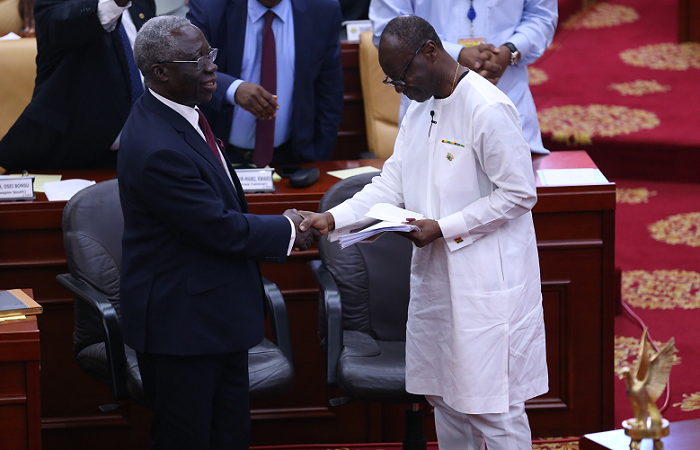
Govt aims to put Ghana beyond aid
The government has outlined ambitious policy initiatives estimated to cost GH¢58,137 billion that will spur economic growth and boost its industrialisation drive. The initiatives are expected to provide more than 800,000 jobs in the first year, scrap some taxes that will propel private sector growth and some social interventions that will bring some reliefs to the poor and vulnerable.
President Nana Addo Dankwa Akufo-Addo’s maiden budget, on the theme: “Sowing the seeds for growth and jobs”, lends credence to some of his flagship promises captured in the budget.
Presenting the Government’s Budget Statement and Economic Policy for 2017 to Parliament yesterday, the Minister of Finance, Mr Ken Ofori-Atta, said the plan to implement the government’s much publicised policy of establishing one factory in every district was expected to provide at least 350,000 direct and indirect jobs once implemented.
That was expected to cost an initial GH¢456 million for the fulfilment of its one district, one factory campaign pledge, he said.
“This will be part of a broader national industrialisation revitalisation policy that will provide jobs for Ghana's unemployed youth,” Mr Ofori-Atta stated.
Under the policy, one medium-to-large factory will be established across the 216 districts in Ghana, an initiative which is expected to be driven by the private sector.
He said the programme would create massive youth employment, add value to raw materials, stimulate growth in all parts of the country, as well as promote export and improve foreign exchange earning for the country.
Ghana beyond aid
“This budget presents a clear roadmap on how we will move this economy from its current state into a full-fledged middle income economy–Ghana beyond aid.
“Mr Speaker, our goal is to build the most business-friendly and people-centred economy in Africa, which will translate into job creation and prosperity for all Ghanaians. We will strike the right balance between fiscal consolidation and growth, by making credible policy choices that will create the fiscal space to implement growth enhancing initiatives,” he said.
Stimulus package
Mr Ofori-Atta said a stimulus package had been set aside for companies that were otherwise viable but were facing potential extinction.
The government also announced a GH¢94 million package for the commencement of its one village, one dam pledge expected to take off later this year.
Outlining some specific measures to be introduced this year, the Finance Minister said the government would focus on improving liquidity for banks through the payment of debts owed by state-owned enterprises (SOEs).
Debt sustainability
“We will pay debts owed banks over the short to medium-term, in line with our debt sustainability framework. We will also streamline the Energy Sector Levy Act, 2015 (Act 899,) (ESLA) to accommodate all the existing legacy debts for the banking and the private sectors, which include the energy sector debt, bulk distribution companies (BDCs) and other energy sector related debts," Mr Ofori-Atta said.
He said the government would work with the commercial banks to ensure that they were able to issue bonds on the back of the streamlined ESLA revenue for immediate liquidity.
That, he said, would ensure that revenue streams from the ESLA were properly used to ensure certainty of cash flow for the payment of all corresponding debts to reduce systemic risk exposure of the banking sector.
Banking sector reforms
The Finance Minister said the Central Bank would collaborate with the government to undertake a number of structural reforms in the banking sector.
According to him, there would be an increase in the banking industry’s minimum capital requirement which would strengthen the licensing and regulatory framework.
The government was also looking at introducing risk capital requirements, in addition to minimum capital requirements for banks, he said.
Other programmes listed by the Finance Minister included the establishment of the infrastructure for poverty eradication for each constituency to receive the cedi equivalent of $1 million to combat poverty and the establishment of the Zongo Development Fund to support the development of Zongo communities.
The minister, who at the tail end of his presentation christened the budget, ‘Asempa budget’, also said there were plans to roll out the national identification system to help formalise the economy and the free senior high school to ensure equal opportunities for students.
Additionally, Mr Ofori-Atta said the government would also roll out the national digital addressing system and the restoration of teachers and nursing trainee allowances.